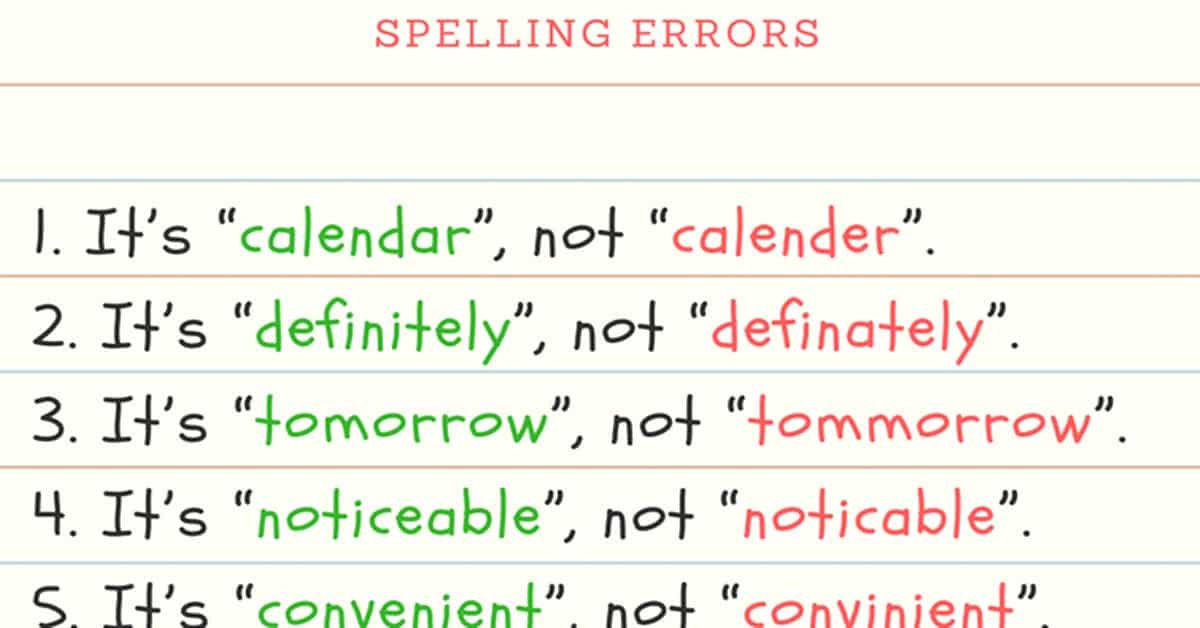240 Common Spelling Mistakes in English
English spelling can be tricky, even for English speakers! That’s because English is not 100% phonetic and also because there are so many exceptions. Study the 240 most commonly misspelled words below. Then, try the free spelling test at the end to check how well you’re doing.


While some words admit multiple spellings, some are not considered standard, and thus are misspellings. A misspelled word can be a series of letters that
Misspellings may be due to either typing errors, or lack of knowledge of the correct spelling. Whether or not a word is misspelled may depend on context, as is the case with American / British English distinctions. Misspelling can also be a matter of opinion when variant spellings are accepted by some and not by others.
Incorrect:
Correct: accommodation
Incorrect:
Correct: achieve
Incorrect:
Correct: across
Incorrect:
Correct: address
Incorrect:
Correct: appearance
Incorrect:
Correct: assassination
Incorrect:
Correct: beginning
Incorrect:
Correct: business
Incorrect:
Correct: colleague
Incorrect:
Correct: committee
Incorrect:
Correct: conscious
Incorrect:
Correct: copyright
Incorrect: dependance
Correct: dependence
Incorrect: desireable
Correct: desirable
Incorrect:
Correct: embarrass
Incorrect:
Correct: environment
Incorrect:
Correct: February
Incorrect:
Correct: forty
Incorrect: glamourous
Correct: glamorous
Incorrect:
Correct: independence
Incorrect:
Correct: interrupt
Incorrect:
Correct: interesting
Incorrect:
Correct: knowledge
Incorrect:
Correct: library
Incorrect: lightening
Correct: lightning
Incorrect: mischievious
Correct: mischievous
Incorrect:
Correct: misspell
Incorrect:
Correct: necessary
Incorrect:
Correct: niece
Incorrect: calender
Correct: calendar
Incorrect:
Correct: definitely

Incorrect:
Correct: tomorrow
Incorrect:
Correct: noticeable
Incorrect:
Correct: convenient
Incorrect:
Correct: deteriorate
Incorrect:
Correct: disappear
Incorrect:
Correct: argument
Incorrect:
Correct: Wednesday
Incorrect:
Correct: ignore
Incorrect:
Correct: occurred
Incorrect:
Correct: opportunity
Incorrect:
Correct: queue
Incorrect:
Correct: speech
Incorrect:
Correct: their
Incorrect: truely
Correct: truly
Incorrect:
Correct: leisure
Incorrect:
Correct: seize
Incorrect:
Correct: weird
Incorrect:
Correct: interesting
Incorrect:
Correct: knowledge
Incorrect: lollypop
Correct: lollipop
Incorrect:
Correct: parallel
Incorrect:
Correct: pastime
Incorrect:
Correct: pursue
Incorrect:
Correct: potato
Incorrect:
Correct: preceding
Incorrect:
Correct: pronunciation
Incorrect:
Correct: receive
Incorrect:
Correct: recommend
Incorrect:
Correct: rhythm
Incorrect:
Correct: schedule
Incorrect:
Correct: siege
Incorrect:
Correct: sentence
Incorrect:
Correct: separate
Incorrect:
Correct: sincerely
Incorrect:
Correct: tattoo
Incorrect:
Correct: tendency
Incorrect:
Correct: until
Incorrect:
Correct: vacuum
Incorrect:
Correct: vegetarian
Incorrect:
Correct: wherever
Incorrect:
Correct: written
Incorrect:
Correct: finally
Incorrect:
Correct: fluorescent
Incorrect:
Correct: government
Incorrect:
Correct: grammar
Incorrect:
Correct: happened
Incorrect:
Correct: dilemma
Incorrect:
Correct: existence
Incorrect:
Correct: familiar
Incorrect:
Correct: foreign
Incorrect:
Correct: further
The Most Common Spelling Mistakes for English Language Learners
The English language doesn’t always seem completely logical and some spellings aren’t obvious, even to native speakers. These are words that you just have to learn.
This is especially confusing when it comes to words that sound the same but have different meanings. It’s very easy to mix these up when you’re writing them down, but it will cost you a lot of marks in your writing exam.
Let’s look at some of the most common mistakes that English learners make – and how to avoid them.
It’s and Its
“It’s” is short for it is. Here, the apostrophe takes the place of the “i”. For example, you would write “it’s very cold outside” (it is very cold outside) or “it’s
“Its” means that the next thing in the sentence belongs to whatever the “it” is. For example, you could say, “the dog dropped its ball” or “the best thing about the iPhone is its camera”. In these sentences, it would not make sense to say “the dog dropped it is
So, if you are unsure of which to use, replace “it’s”/”its” with “it is”. If it still makes sense, you should use “it’s”. It if doesn’t, use “its”.
They’re, Their and There
“They’re” is the plural version of the “it’s”. It’s short for “they are”. For example: “What time are your friends arriving?” “They’re arriving at
“Their” is the plural form of “its”, “hers” or “his”. For example, “The children put on their shoes” or “the lions showed their teeth”.
Finally, “there” refers to a place – to where something is. For example, you could say “I put the book over there” or “The car is parked there”, or “It was there that we saw the fireworks”.
The English language doesn’t always seem completely logical and some spellings aren’t obvious, even to native speakers. These are words that you just have to learn.
This is especially confusing when it comes to words that sound the same but have different meanings. It’s very easy to mix these up when you’re writing them down, but it will cost you a lot of marks in your writing exam.
Let’s look at some of the most common mistakes that English learners make – and how to avoid them.
It’s and Its
“It’s” is short for it is. Here, the apostrophe takes the place of the “i”. For example, you would write “it’s very cold outside” (it is very cold outside) or “it’s
“Its” means that the next thing in the sentence belongs to whatever the “it” is. For example, you could say, “the dog dropped its ball” or “the best thing about the iPhone is its camera”. In these sentences, it would not make sense to say “the dog dropped it is
So, if you are unsure of which to use, replace “it’s”/”its” with “it is”. If it still makes sense, you should use “it’s”. It if doesn’t, use “its”.
They’re, Their and There
“They’re” is the plural version of the “it’s”. It’s short for “they are”. For example: “What time are your friends arriving?” “They’re arriving at
“Their” is the plural form of “its”, “hers” or “his”. For example, “The children put on their shoes” or “the lions showed their teeth”.
Finally, “there” refers to a place – to where something is. For example, you could say “I put the book over there” or “The car is parked there”, or “It was there that we saw the fireworks”.





